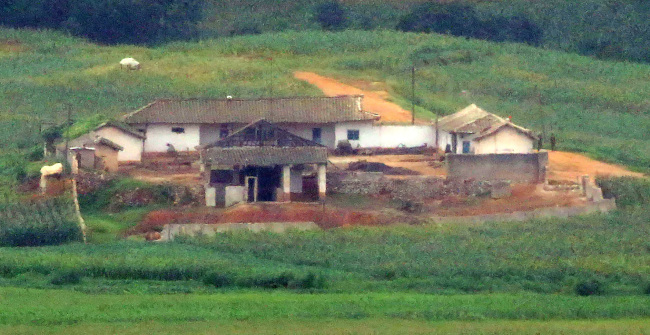Although the rare cross-border talks brought the two Koreas away from the brink of an armed clash Tuesday, concerns persist over whether the development would effectively end what South Korea terms the “vicious cycle” of North Korean provocations.

Following the four-day talks that stretched into Tuesday morning, Pyongyang offered a rare expression of “regret” in a joint press statement over the injuries inflicted this month on two South Korean troops by the “detonation” of land mines in the Demilitarized Zone.
But the statement did not specify what Seoul has repeatedly called a “provocation,” thereby failing to clearly hold Pyongyang responsible for the Aug. 4 attack that led the South to resume propaganda broadcasts on Aug. 10 for the first time in 11 years.
A senior Seoul official said that it was meaningful for Pyongyang to express regret, particularly when the North has been flatly denying responsibility for the attacks. Also noteworthy was that the North engaged in dialogue despite the ongoing South Korea-U.S. military drills, which it berated as a rehearsal for a nuclear war against it.
“If you look at the past statements, it is very rare for the North to specify itself as the very party to express regret. So this, we think, is meaningful,” a senior Seoul official told reporters on customary condition of anonymity.
But analysts pointed out that the carefully worded phrase depicts the North as expressing regret as a third party would, and not as a perpetrator.
“We could sense some feeling of atonement from North Korea, but the statement also sounded like a third party trying to console the injured soldiers of another country,” said Chang Yong-seok, senior researcher at Seoul National University’s Institute for Peace and Unification.
“What’s worse, the statement has no mention of any recent provocative acts done by the North Korean side,” he added, referring to a set of incidents including the artillery attacks in the tense inter-Korean border last Thursday.
Despite multiple provocations by North Korea since the end of the 1950-53 Korean War, the reclusive state has expressed regrets or apologies on only a few occasions, without unequivocally recognizing its culpability.
In May 1972, the North offered an apology after its spies infiltrated Cheong Wa Dae in January 1968. But it shifted the blame to “extreme leftist elements” in the North.
In August 1976, the North expressed regret to the then U.S.-led U.N. Command chief over the so-called ax murder incident in which North Korean soldiers killed two U.S. soldiers who were trimming a tree in the DMZ.
In another spy infiltration case in September 1996, the North expressed regret, saying it would try not to allow a reoccurrence. Most recently, the North expressed regret over the 2002 naval skirmish in the West Sea.
But the North continues to deny its responsibility for the torpedo attack on the Cheonan warship in March 2010 that killed 46 sailors. For the shelling of Yeonpyeongdo Island in November the same year, which killed four South Koreans, it argues the South triggered the attack by conducting a live-fire drill.
To the chagrin of many conservatives here who said Seoul should secure assurances from the North to stop future provocations, the statement failed to include Pyongyang’s pledge to prevent a recurrence of border attacks.
The statement, for the time being, declares that the propaganda broadcasts near the Military Demarcation Line will resume in the event of any “abnormal situation.” Officials said such an abnormal situation would be defined by Seoul if it occurs, meaning propaganda broadcasts could be reinstated at any time if the need arises.
Considering the history of North Korea using loopholes of inter-Korean deals or multinational pacts to back out of them, how to enforce the agreement is crucial, analysts said.
“So far, the two Koreas have always bickered over their past agreements due to their conflicting interpretations of them. Many of the agreements have thus fallen apart or been invalidated,” said Koh Yoo-hwan, a North Korean studies professor at Dongguk University.
“What is crucial for now is not our evaluations on the success of this week’s negotiations, but our efforts to devise ways to effectively enforce the agreement that came out of the talks.”
Already, there appeared to be different interpretations, albeit minimal.
For instance, Pyongyang’s statement said its quasi-state of war would be lifted at the same time Seoul stopped its propaganda broadcasts. But Seoul’s statement did not have such a condition stated for the lifting of the North’s emergency state.
Nonetheless, the agreement appears to have laid basic conditions to restart bilateral cooperation, as it states that the two Koreas will hold working-level talks on a regular basis and activate cross-border exchanges in various civilian sectors, the analysts said.
But they noted that a host of pending issues, particularly the North’s nuclear program, would continue to pose hurdles to Seoul’s efforts to fundamentally improve the bilateral relationship.
“There are still limits to improving the relations at a time when Seoul and Washington have been increasing pressure on the North to give up its nuclear program. We will also wait and see how the working-level talks unfold in the future,” said Chang of the Institute for Peace and Unification.
“With the two Koreas moving to start the talks on separated family reunions, we can mistakenly think that the relationship is fundamentally improving. But there is still a series of structural issues that are left unresolved.”
By Song Sang-ho (sshluck@heraldcorp.com)









![[Hello India] Hyundai Motor vows to boost 'clean mobility' in India](http://res.heraldm.com/phpwas/restmb_idxmake.php?idx=644&simg=/content/image/2024/04/25/20240425050672_0.jpg&u=)








